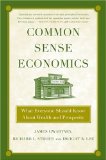I just finished reading Common Sense Economics: What Everyone Should Know About Wealth and Prosperity. This book is an introduction to the key fundamentals of Economics, as well as a bit of Personal Finance. It’s a relatively small book too, one you can easily read in a day.
Common Sense Economics is a great book to read if you are new to Economics, haven’t studied Economics for a long time, or if you are currently clueless about your money and/or the Economy.
This book is divided into three parts. The first two deal with Economics and Government. The last part deals with Personal Finance. The inclusion of the Personal Finance part can either make this book the perfect fit for you or it may leave you wanting more. If your personal financial life is already under control, you won’t gain anything from this third part. If you have yet to take control of that part of your life, this chapter provides you an excellent outline for how to get started.
Some highlights from the book:
The reality of life on our planet is that productive resources are limited, while the human desire for goods and services is virtually unlimited. Because there is “no free lunch,” we must sacrifice something we value in order to get something else.
Politicians often speak of “free education,” “free medical care,” or “free housing.” This terminology is deceptive. These things are not free. Scarce resources are required to produce each of them. Governments may be able to shift costs, but they cannot avoid them.
Nearly all choices are made at the margin. That means that they almost always involve additions to, or subtractions from, current conditions, rather than “all-or-nothing” decisions. The word “additional” is a substitute for “marginal.” We don’t make “all-or-nothing” decisions, such as choosing between eating or wearing clothes—dining in the nude so that we can afford food.
The foundation of trade is mutual gain. The motivation for trade is summed up in the statement: “If you do something good for me, I will do something good for you.” Trade is productive because it permits each of the trading partners to get more of what he or she wants.
An increase in government transfers will reduce the incentive of both the taxpayer-donor and the transfer recipient to earn income. Economic growth will thereby be retarded.
Competition for transfers will erode most of the long-term gain of the intended beneficiaries.
Programs that protect potential recipients against adversity arising from their imprudent decisions encourage them to make choices that increase the likelihood of the adversity.
Providing others with goods and services that are highly valued compared to their cost is the key to financial success.
I really enjoyed this book and highly recommend it. I borrowed it from the library, but I intend to purchase my own copy soon. Both for future reference and so I can loan it to friends. It makes for a great Economics primer and the section on Governments’ role in Economics is excellent…and quite timely given the current insanity in our nation’s bailout-addicted political climate.

Comments are closed.